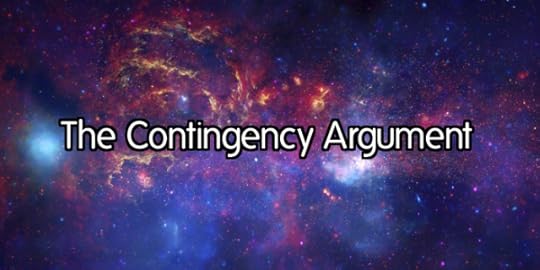The Contingency Argument for God’s Existence
Perhaps my favorite cosmological argument for the existence of God is the contingency argument. It goes like this:
Whatever exists that does not have to exist requires an explanation for its existence.
The physical universe does not have to exist.
Therefore, the universe requires an explanation insomething that must exist.
God is the only being that must exist.
Therefore, God is the explanation for the existenceof the universe.
The first premise of this argument reflects the human perception that there are reasons for the existence of the things we see around us. This is what drives science, as well as every other branch of study. It’s the great question: “Why?” This question applies to anything that doesn’t have to exist or that could be different from what it is (what philosophers sometimes refer to as “contingent” things).
For example, when astronomers discovered red- colored stars, they tried to explain their existence. To say that there isn’t an explanation—not that we don’t know it but that there actually isn’t one—strikes at the foundation of rational thought. It’s to reject the whole premise that underlies the quest for knowledge. The first premise of our argument thus seems secure.
So does the second premise. If we look around the physical universe, we see it filled with stars and galaxies. And we see that the things within it obey certain laws and those physical laws have certain constants, or unchanging values.
For example, the constant C in E=MC2 refers to the speed of light, or 186,000 miles per second. This fact about light never changes, and so it is called a constant. There are many other constants, such as the gravitational constant: Gravity is so strong and not stronger or weaker. We experience three dimensions of space and one of time, not more or less.
Why?
At one time the universe didn’t contain stars and galaxies. Why do those objects exist now when they clearly don’t have to? All of these matters are subjects of scientific inquiry, and they reveal that the physical universe as a whole is contingent. That is, the universe is one way but could be another, or it could simply not be at all. It there- fore needs a reason for its own existence—an explanation.
But let’s inquire a bit further and ask about what could explain the way the physical universe is. Whatever it is, it must be greater than the physical universe; it must be something beyond space and time, beyond matter and energy, but with the power to create each of these and to establish the laws that they obey. It would be something that explains its own existence and could not fail to exist.
Once again, that sounds a lot like God: what philosophers call a “necessary” being: God could not be different from what he is, which is what premise 3 states.
This is something our intuition also tells us. There must be an ultimate explanation, one that doesn’t de- pend on anything else, and thus one that explains everything else. There must be something fundamental, something that grounds all the contingent things we see around us. And thus there must be a God.
The Leibnizian Cosmological Argument
My favorite formulation of the contingency argument is by German mathematician and philosopher Gottfried Wilhelm von Leibniz. Here is an excellent video explaining and defending it:
My New Book
I have recently published book with Catholic Answers in which I respond to twenty common objections and questions posed by atheists. It’s a short book (about 70 pages) and therefore we’re able to sell them in bulk for as low as $1. Click the image below to buy your copy/copies.
Matt Fradd's Blog
- Matt Fradd's profile
- 168 followers





